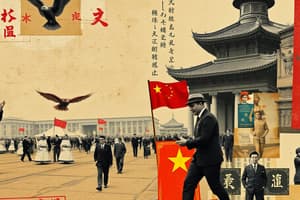Podcast
Questions and Answers
What differences in the process of child rearing did Lareau find among middle class, working class, and poor families?
What differences in the process of child rearing did Lareau find among middle class, working class, and poor families?
Lareau found that middle class families practice 'concerted cultivation,' while working class and poor families facilitate the 'Accomplishment of Natural Growth.'
What research method(s) did Annette Lareau use to collect data for her study?
What research method(s) did Annette Lareau use to collect data for her study?
Naturalistic and intensive observations, along with interviews of parents, teachers, and other personnel.
The authors of 'The Battered-Child Syndrome' were carrying out the role of ________ in the emergence of the new wave of concern about child abuse.
The authors of 'The Battered-Child Syndrome' were carrying out the role of ________ in the emergence of the new wave of concern about child abuse.
claims makers
________________________ states that 'if men define situations as real, they are real in their consequences.'
________________________ states that 'if men define situations as real, they are real in their consequences.'
As described by C. Wright Mills, ___________________ is the ability to relate personal elements to social forces.
As described by C. Wright Mills, ___________________ is the ability to relate personal elements to social forces.
The practice of judging another culture by the standards of one's own culture is called __________.
The practice of judging another culture by the standards of one's own culture is called __________.
A __________________ is a continuing pattern of social relationships intended to fulfill people's basic needs.
A __________________ is a continuing pattern of social relationships intended to fulfill people's basic needs.
______________ refers to the practice of taking into account the differences across cultures without passing judgment.
______________ refers to the practice of taking into account the differences across cultures without passing judgment.
This situation, being without meaningful or useful norms, is called ___________.
This situation, being without meaningful or useful norms, is called ___________.
Match Marx's terms for social classes with their definitions:
Match Marx's terms for social classes with their definitions:
____________________ refers to a life-long process by which individuals internalize a society's values and norms.
____________________ refers to a life-long process by which individuals internalize a society's values and norms.
Flashcards are hidden until you start studying
Study Notes
Child Rearing and Class Distinctions
- Annette Lareau identified two distinct parenting styles linked to social class: "concerted cultivation" and "Accomplishment of Natural Growth."
- Middle-class families employ "concerted cultivation," which involves organizing extensive extracurricular activities, fostering skills for white-collar jobs.
- Working-class and poor families typically practice "Accomplishment of Natural Growth," allowing children more free time and less parental involvement in structured activities.
- Middle-class children develop a sense of entitlement, while working-class children experience feelings of distance and constraint in institutional settings.
Research Methods
- Lareau conducted naturalistic and intensive observations of twelve families, including a racial mix of six white, five black, and one interracial family.
- Data collection included observing children's daily routines in various settings and conducting interviews with parents and educators.
Child Maltreatment and Claims Makers
- "The Battered-Child Syndrome," published in 1962, revealed that many previously considered accidental injuries in children were actually inflicted by adults.
- Authors Kempe, Silverman, Steele, Droegemuller, and Silver played the role of claims makers in raising awareness of child abuse.
The Thomas Theorem
- The Thomas Theorem explains that people's definitions of situations shape their perceptions and behaviors, highlighting the importance of subjective interpretation in social interactions.
Sociological Imagination
- C. Wright Mills described sociological imagination as the capacity to connect personal life experiences to broader social forces and historical contexts.
Ethnocentrism
- Ethnocentrism is the practice of evaluating another culture based on the standards of one's own culture, often leading to bias and misunderstanding.
Social Institutions
- A social institution is a pattern of social relationships that fulfills basic needs and functions essential for societal operation.
Cultural Relativism
- Cultural relativism promotes understanding and acknowledging cultural differences without judgment or assigning value.
Anomie
- Anomie refers to a state characterized by the absence of meaningful norms and values, leading to feelings of disconnection and confusion.
Marx's Class Theory
- Karl Marx posited that capitalism leads to growing inequality, resulting in a rebellion by the impoverished majority against the ruling capitalist class, known as the bourgeoisie, while the majority is termed the proletariat.
Socialization
- Socialization is a lifelong process where individuals internalize societal values, beliefs, and norms, learning to function as active members of society.
Studying That Suits You
Use AI to generate personalized quizzes and flashcards to suit your learning preferences.




